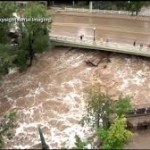 Pets have been routinely evacuated from flood areas in Colorado, despite life-threatening conditions for the rescuers, because officials there made a conscious decision to save pets and people, adopting the motto “No pets left behind,” according to a National Guard spokesman. Lessons learned from Hurricane Katrina led rescuers to include pets in their evacuation plans, and temporary shelters have been ready with pet essentials including water bowls and kenneling capabilities. The Seattle Times/The Associated Press
Pets have been routinely evacuated from flood areas in Colorado, despite life-threatening conditions for the rescuers, because officials there made a conscious decision to save pets and people, adopting the motto “No pets left behind,” according to a National Guard spokesman. Lessons learned from Hurricane Katrina led rescuers to include pets in their evacuation plans, and temporary shelters have been ready with pet essentials including water bowls and kenneling capabilities. The Seattle Times/The Associated Press
By JERI CLAUSING Associated Press
In contrast to stories of people forced to leave their pets when New Orleans was swamped by Hurricane Katrina, the motto during one of the largest evacuations in Colorado history was “No pets left behind,” said Skye Robinson, a spokesman for the National Guard air search and rescue operations during Colorado’s floods. That’s because including pets in the rescue effort helped convince even reluctant residents to leave their homes. Officials also had more than enough space for the animals and even carried animal crates with them.
More than 800 pets have been ferried to safety with their owners via helicopter, the National Guard said. Hundreds more were rescued by ground crews. Livestock, like horses and cattle, were left behind, but a monkey was among those saved.
Once safely on dry ground, Red Cross shelters had water bowls, on-site dog kennels and all the necessary supplies to ensure already stressed evacuees wouldn’t be separated from their pets.
“We kind of learned after Katrina, when people wouldn’t evacuate because of their pets,” said Kathy Conner, a worker at a shelter at a YMCA in Boulder.
Evacuees Jerry Grove and Dorothy Scott-Grove said they never would have abandoned their vacation cabin in Estes Park without their two golden retrievers. But they didn’t have to make that hard choice. Firefighters carried the two large dogs to safety on the same zip line used to rescue the retired Ohio couple.
“They put them in a harness and one of the firefighters hooked himself to them and brought them across,” Dorothy Scott-Grove said. “We will not be separated.”
Once out, the Red Cross found the couple a pet-friendly hotel where the dogs the next day “were resting comfortably on our king-sized bed,” she said.
In a state where dog passengers are as common as humans in cars, Lisa Pedersen, CEO of the Humane Society of Boulder Valley, said taking care of pets has become a central part of disaster planning.
It appears to be working. One week after floods and mudslides forced the local evacuation of more than 3,000 people, Pederson said the Boulder area shelter had just 72 pet evacuees – all but two of which were delivered by their owners for temporary shelter after they were forced from their homes.
“It just makes sense that you bring the pets along. They are part of the family,” Robinson said. “You wouldn’t leave a family behind because they had kids.”
———–
Follow Jeri Clausing on twitter (at)jericlausing


Leave a Reply